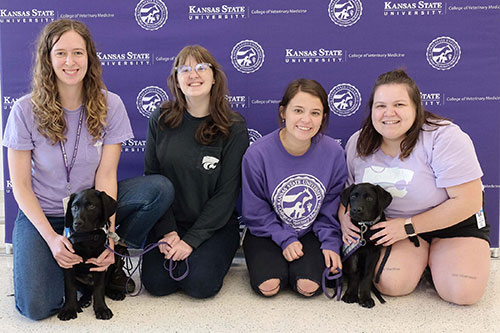October 4, 2022
College of Veterinary Medicine welcomes KSDS service dogs to enhance student experience
 |
From left: Rebekah Arnold, Ohlde, Kathleen Wardman, Madison Lathem, Snyder and Jayme Williams |
Two puppies in training, named for Kansas State University athletics legends, are being welcomed at the College of Veterinary Medicine — although not as patients in the Veterinary Health Center. In cooperation with Kansas Specialty Dog Service, or KSDS, Assistance Dogs Inc., the two service dogs, Snyder and Ohlde, are part of a new student community service initiative.
"Snyder and Ohlde are the two newest members of our veterinary family as the 'class dogs' for our first- and second-year Doctor of Veterinary Medicine students," said Hodes Family Dean Bonnie Rush. "We are delighted to support the Kansas Specialty Dog Service Assistance Dogs Inc. with puppy-raising. There is no better environment for their socialization and command training. We look forward to contributing to the development of a service dog that will significantly enhance someone's life in the future."
At 14 weeks old, the two male Labrador puppies are part of the Kansas Specialty Dog Service training program. Each will be trained and socialized by sets of two host students acting as the official puppy-raisers, while other students in the college will be able to assist. The puppy raisers are Madison Lathem and Jayme Williams, who will care for Snyder in the first-year class. Second-year students Kathleen Wardman and Rebekah Arnold will be responsible for Ohlde.
"The goal for the first phase of training is to provide the puppies with socialization and teach them a set of 30 commands," Rush said. "The college will provide faculty mentorship and an oversight committee. The puppies will be socialized in the lecture halls and student study areas and will attend college events but will not be introduced to teaching laboratories or the clinical training program. Their health care will be provided by the Veterinary Health Center, where they will receive excellent medical care and extra special attention."
After the initial 18-month training period, Ohlde and Snyder will be returned to Kansas Specialty Dog Service for specialty training as a guide, service or facility dog or may remain at the service as part of the breeding program. The service will regularly check on the puppies' progress and provide guidance as needed.
"We've posted training commands in our first-year and second-year lecture halls and student success centers so that all of our students can easily help out in training Snyder and Ohlde," said James Roush, associate dean for academic programs and student success. "We look forward to enjoying their presence in our facilities, although we are reminding students that the puppies are not allowed to have human food or treats at any time. Also, their puppy-raisers will have final say on how the puppies are cared for."
